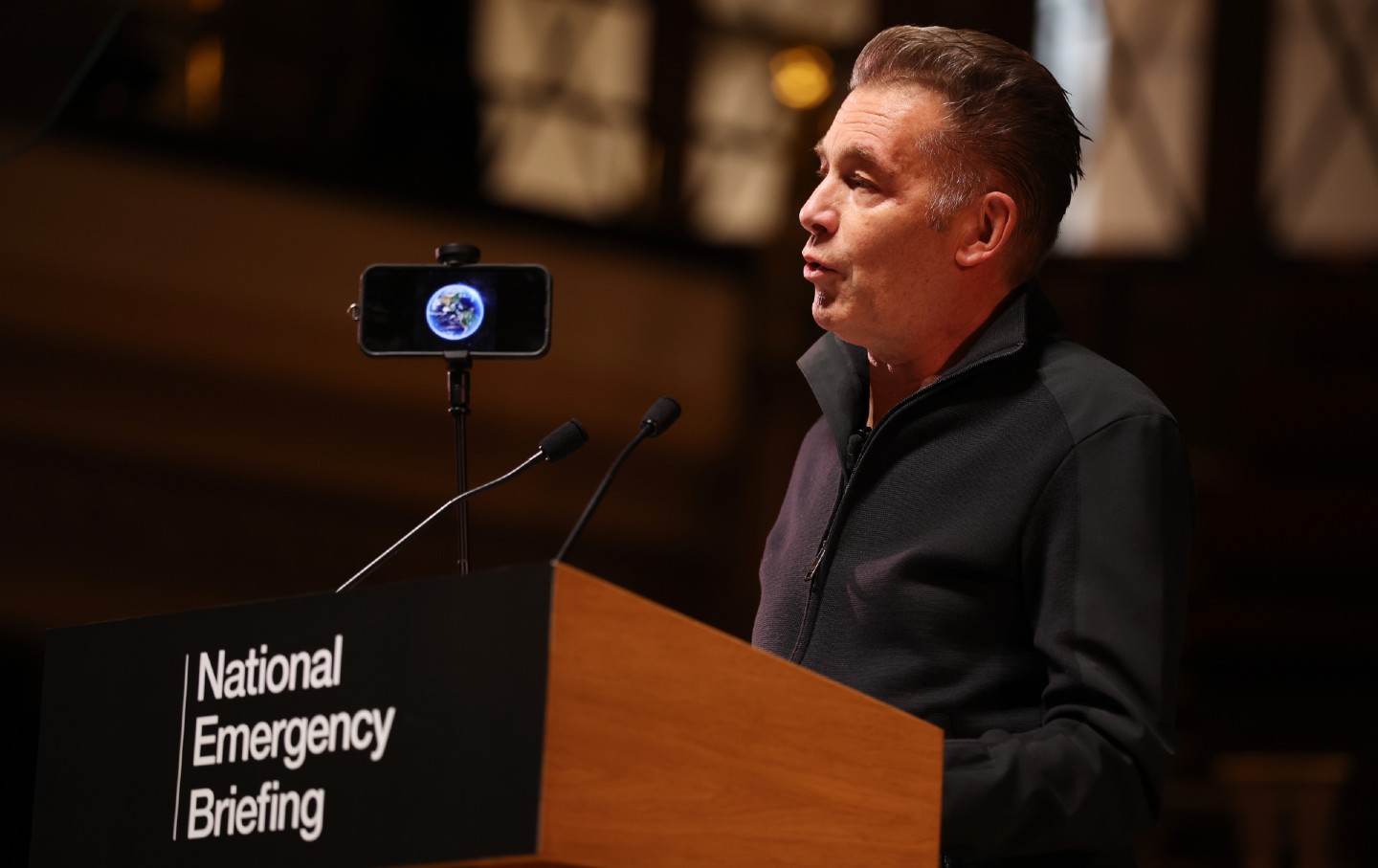These Activists Are Right: The World Doesn’t Need Any More Private Jets
Local activists in Massachusetts have taken on the private jet lobby—and they might just win.

A Gulfstream G650ER jet prepares to land at Ronald Reagan Washington National Airport on November 7, 2023.
(Kevin Carter / Getty Images)Concord, Massachusetts—A struggle that pits regional environmental activists against an airport expansion for private jets has national—and even global—implications.
Private developers have proposed a massive new private jet facility, doubling the jet hangar capacity, at Hanscom Field, New England’s largest general aviation airport, already with 38,000 private jet flights annually. Hanscom is owned and operated by Massport, a public authority that also owns Logan International Airport in Boston, the region’s largest commercial airport, and Worcester Airport.
Hanscom Field is located in Bedford, Concord, Lexington, and Lincoln, Massachusetts—communities renowned as the location of the first skirmishes in the American Revolutionary War in 1775. This April, as the Commonwealth celebrates the 250th anniversary of the “shot heard ’round the world,” activists across the state will be celebrating a year of organizing since 20 activists were arrested for occupying the tarmac and temporarily closing the airfield in protest of the expansion.
Frequent fliers in and out of Hanscom include billionaire Robert Kraft, owner of the New England Patriots, and John Henry, the billionaire owner of the Boston Red Sox and the Boston Globe, the region’s largest newspaper. In October 2023, the Globe ran a front-page story with the headline, “Billionaires are responsible for large amounts of climate pollution from Hanscom, a new report finds.”
The fate of the airport expansion lies with the Massport board. Massachusetts Governor Maura Healy has not taken a position, waiting for the environmental review process to play out. A statewide coalition of more than 100 organizations opposes the expansion, arguing that the proposed hangars will lead to increased jet operations and dramatic increases in greenhouse gas emissions.
After the hottest two years on record, private jets are under renewed scrutiny as one of the most carbon-polluting modes of transportation in the world. A new international study from Sweden found that carbon dioxide emissions from private jet travel surged 46 percent between 2019 and 2023, with 68.7 percent of the private jets registered in the United States. In 2023, direct private jet emissions were 15.6 tons, with an average of 3.6 tons per flight.
The Swedish study found that only 0.003 percent of the population use private jets, around 256,000 people worldwide. Each of them produces nearly 500 times more carbon dioxide in a year than the average citizen. The study also found that half the flights (47.4 percent) were shorter than 311 miles, and “flight pattern analysis confirms extensive travel for leisure purposes, and for cultural and political events.” An October 2023 study that I co-authored found that at least half the private jet flights out of Hanscom go to recreation destinations like Nantucket, Martha’s Vineyard, or the Super Bowl.
Private equity investor Jeffrey Leerink, of Leerink Partners, is one of the two lead private developers of the Hanscom expansion. For years, Leerink has served as a close private-equity adviser to Steward Health Care and its billionaire owner, Ralph de la Torre, disgraced for his milking cash from the hospital chain while buying yachts and jets.
Leerink helped de la Torre unload a group of failing Utah hospitals in 2023 and is one of the investment bankers embroiled in the Steward bankruptcy that threatens the future of hospital services for thousands of Massachusetts residents. Leerink, and his development partner, Norwood Cadillac dealer Michael Argiros, have no prior experience with aviation.
The private jet lobby and its billionaire clients are used to getting their way, especially with public airport authorities that have been effectively captured by the aviation industry and view their role as promoting a rapidly expanding aviation sector. But a statewide coalition, Stop Private Jet Expansion at Hanscom or Anywhere (SPJE), has aggressively challenged Massport and Leerink’s Runway Realty Ventures LLC at every step along the way.
As part of their campaign, over a dozen cities and towns from across the Commonwealth have passed resolutions to reject the proposed expansion, and over 14,000 individuals have signed a petition to the governor urging her to halt the proposal. In April 2024, 20 protesters from Extinction Rebellion blocked operations at Hanscom, demonstrating that activists are prepared to engage in nonviolent direct action to stop the project if the expansion proceeds.
In the last eight months, the anti-expansion campaigners have turned the tables on the powerful private jet lobby.
Endangering National Treasures. In May 2024, because of the threat of the proposed Hanscom private jet expansion, the National Trust for Historic Preservation designated Minute Man National Historical Park, Walden Pond, and nearby landmarks as one of America’s 11 Most Endangered Historic Places, thereby bringing national attention to these ill-conceived private jet plans.
Responding to Developers’ Environmental Proposal. Earlier in 2024, Leerink’s team of developers submitted an environmental proposal for the Hanscom expansion to the Commonwealth that was replete with fantastic and shoddy claims and projections. Leerink’s team declared that their 522,000-square-foot proposed hangar expansion to house 66 to 79 additional private jets would decrease private jet operations at Hanscom and would actually reduce emissions. But independent research conducted by Industrial Economics Inc. found the opposite: that the Hanscom expansion would add approximately 6,000 private jet flights a year, adding around 150,000 tons of carbon dioxide annually over current levels.
Popular
“swipe left below to view more authors”Swipe →Over 1,500 public comments were submitted to Massachusetts environmental regulators, most overwhelmingly opposed to the project. Many commenters pointed out that if expansion proceeds, private jet emissions from Hanscom alone could cancel nearly 70 percent of the environmental benefits of all the solar photovoltaic (PV) ever installed in Massachusetts and undermine the state’s ambitious climate plans.
In June 2024, the state’s top environmental official, Rebecca Tepper, sent the developers back to the drawing board, ruling that Leerink and developers “did not adequately or properly comply with regulations.” The developers must submit a revised environmental statement to fill in the large information gaps in their proposal, including responding to the Industrial Economics study. That revised report is still pending, but Massport anticipates a resubmission before the summer of 2025.
Changing the Massport Charter to Address Climate Change. Activists recognized that part of the problem was Massport, an agency founded in 1956 with the mission of promoting civil aviation and economic growth. They pushed for a fundamental shift in the agency’s charter. In November 2024, the Massachusetts legislature passed a comprehensive climate bill that included an update to Massport’s charter to require the agency to address greenhouse gas emissions from aviation.
The revised charter requires the agency to promote “environmental protection and resilience, reductions in greenhouse gas emissions, and environmental justice principles” in its decision-making. Massport’s initial charter was written in an era of booming aviation growth, prior to any understanding of climate change.
The legislation, signed by Massachusetts Governor Maura Healey, passed by wide margins in the state Senate with a 38 to 2 vote and House vote of 128 to 17. Most Massachusetts lawmakers understand that private jet expansion at Hanscom is a direct and immediate threat to Massachusetts’s efforts to combat climate change.
Opponents of Hanscom’s expansion are urging Massport and state officials to reject a project that benefits only a tiny sliver of billionaires but sets off a carbon bomb of pollution. They argue that expanding private luxury jet services during a climate emergency is indefensible and irresponsible. Oxfam’s new report, “Carbon Inequality Kills,” observes that “private jets and yachts—aren’t just symbols of excess; they’re a direct threat to people and the planet.”
Climate activists worldwide have been calling for an end to new oil, gas, and coal infrastructure as a critical stage in reducing emissions and making the transition to a clean energy economy. In the coming months, the eyes of the world are on Hanscom Field and whether this expansion project will be defeated.
Disobey authoritarians, support The Nation
Over the past year you’ve read Nation writers like Elie Mystal, Kaveh Akbar, John Nichols, Joan Walsh, Bryce Covert, Dave Zirin, Jeet Heer, Michael T. Klare, Katha Pollitt, Amy Littlefield, Gregg Gonsalves, and Sasha Abramsky take on the Trump family’s corruption, set the record straight about Robert F. Kennedy Jr.’s catastrophic Make America Healthy Again movement, survey the fallout and human cost of the DOGE wrecking ball, anticipate the Supreme Court’s dangerous antidemocratic rulings, and amplify successful tactics of resistance on the streets and in Congress.
We publish these stories because when members of our communities are being abducted, household debt is climbing, and AI data centers are causing water and electricity shortages, we have a duty as journalists to do all we can to inform the public.
In 2026, our aim is to do more than ever before—but we need your support to make that happen.
Through December 31, a generous donor will match all donations up to $75,000. That means that your contribution will be doubled, dollar for dollar. If we hit the full match, we’ll be starting 2026 with $150,000 to invest in the stories that impact real people’s lives—the kinds of stories that billionaire-owned, corporate-backed outlets aren’t covering.
With your support, our team will publish major stories that the president and his allies won’t want you to read. We’ll cover the emerging military-tech industrial complex and matters of war, peace, and surveillance, as well as the affordability crisis, hunger, housing, healthcare, the environment, attacks on reproductive rights, and much more. At the same time, we’ll imagine alternatives to Trumpian rule and uplift efforts to create a better world, here and now.
While your gift has twice the impact, I’m asking you to support The Nation with a donation today. You’ll empower the journalists, editors, and fact-checkers best equipped to hold this authoritarian administration to account.
I hope you won’t miss this moment—donate to The Nation today.
Onward,
Katrina vanden Heuvel
Editor and publisher, The Nation
More from The Nation

What Your Cheap Clothes Cost the Planet What Your Cheap Clothes Cost the Planet
A global supply chain built for speed is leaving behind waste, toxins, and a trail of environmental wreckage.

The UK’s Climate National Emergency Briefing Should Be a Wake-Up Call to Everyone The UK’s Climate National Emergency Briefing Should Be a Wake-Up Call to Everyone
The briefing was a rare coordinated effort to make sure the media reflects the science: Humanity’s planetary house is on fire, but we have the tools to put that fire out.

AI Will Only Intensify Climate Change. The Tech Moguls Don’t Care. AI Will Only Intensify Climate Change. The Tech Moguls Don’t Care.
The AI phenomenon may functionally print money for tech billionaires, at least for the time being, but it comes with a gargantuan environmental cost.

Backsliding in Belém Backsliding in Belém
Petrostates at COP30 quash fossil fuel and deforestation phaseouts.

Wake Up and Smell the Oil. Your Nation’s Military Is Hiding Its Pollution From You. Wake Up and Smell the Oil. Your Nation’s Military Is Hiding Its Pollution From You.
A fact all but ignored at COP30.

Trump Promised to Bring Back Coal. This Town Listened. Trump Promised to Bring Back Coal. This Town Listened.
Through executive orders, Congress, and a loyalist cabinet, the Trump administration has delivered big for enclaves of coal country like Colstrip, Montana. But how long can it las...


